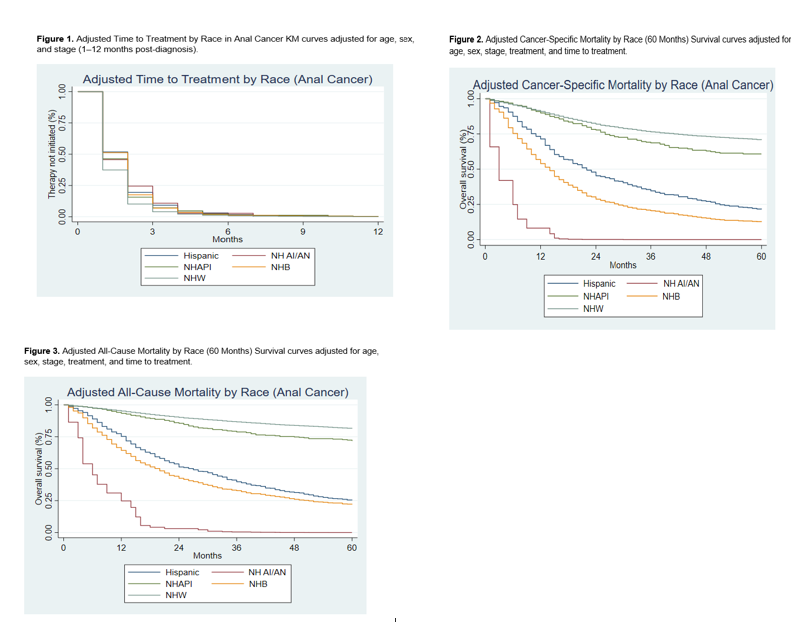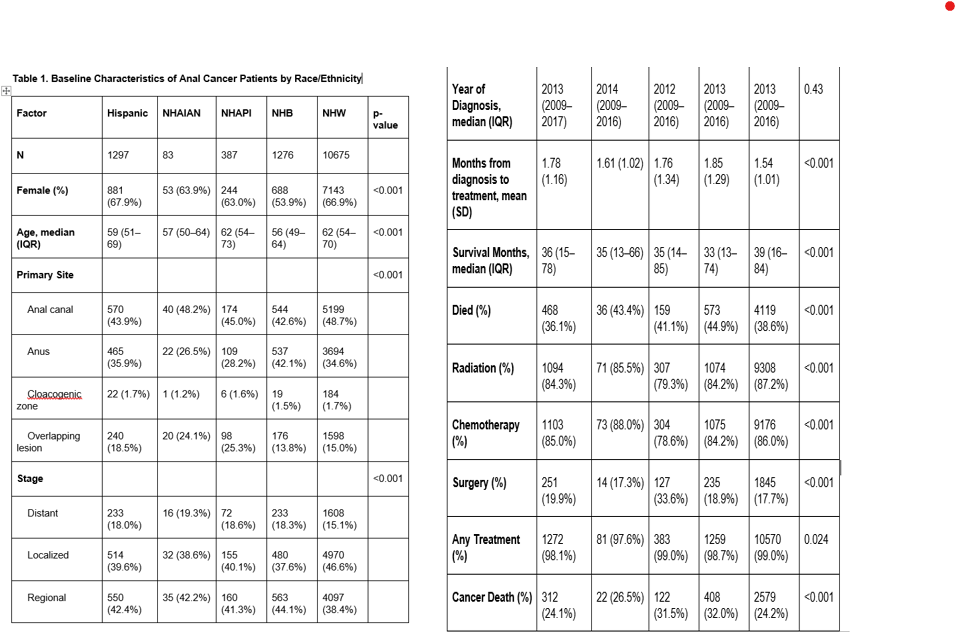Monday Poster Session
Category: Colorectal Cancer Prevention
P2657 - Identifying Racial and Ethnic Disparities in Therapy Delays and Mortality Among Anal Cancer Patients: Insights from the Surveillance, Epidemiology, and End Results Plus Database
Monday, October 27, 2025
10:30 AM - 4:00 PM PDT
Location: Exhibit Hall

Umar Hayat, MD
Geisinger Wyoming Valley Medical Center
Wilkes-Barre, PA
Presenting Author(s)
Award: ACG Presidential Poster Award
Umar Hayat, MD1, Saba Afroz, MD1, Hassam Ali, MD2, Sheza Malik, MD3, Azeem Khalid, MD4, Muhammad Kamal, MD5, Aamir Saeed, MD6, Usman Haider, MD1, Azhar Hussain, MD7, Muhammad Sohaib, MD8, Aman Ali, MD9, Faisal Kamal, MD10
1Geisinger Wyoming Valley Medical Center, Wilkes-Barre, PA; 2East Carolina University/Brody School of Medicine, Greenville, NC; 3Emory University, Atlanta, GA; 4Aiken Regional Medical Centers, Aiken, SC; 5Hackensack Meridian Health, Edison, NJ; 6Vanderbilt University Medical Center, Nashville, TN; 7SUNY Upstate Medical University Hospital, Syracuse, NY; 8UCHealth Parkview Medical Center, Pueblo, CO; 9Wilkes-Barre General Hospital, Scranton, PA; 10Sidney Kimmel Medical College at Thomas Jefferson University, Philadelphia, PA
Introduction: Anal cancer accounts for 2% of gastrointestinal cancers and chemoradiation is now established as the standard of care. Timely initiation of therapy is crucial, as delays negatively impact survival. This study evaluated how racial and ethnic disparities contribute to treatment delays and effect survival in anal cancer patients.
Methods: Our retrospective cohort study utilized the SEER Research Plus database (November 2021 submission), covering 17 cancer registries from 2000 to 2019. The study included 13,718 adults aged 18–84 with histologically confirmed anal cancer. Time-to-treatment was assessed using Cox proportional hazards regression. Separate Cox regression models were used to evaluate 60-month all-cause and cancer-specific mortality. Survival curves stratified by race/ethnicity and adjusted for age, sex, stage, treatment status, and time to treatment were generated using adjusted Cox survival functions. Hazard ratios (HRs) with 95% confidence intervals (CIs) were reported. Log-rank tests were used to compare survival across racial groups.
Results: In our analysis of 60-month all-cause mortality, non-Hispanic Black (NHB) patients had a 41% higher risk compared to non-Hispanic White (NHW) patients (HR 1.41; 95% CI: 1.28–1.56; p < 0.001). Sensitivity analysis showed that each additional month of delay from diagnosis to treatment was associated with a 3.5% increase in all-cause mortality. For cancer-specific mortality over 60 months, NHB patients had a 44% higher risk (HR 1.44; 95% CI: 1.29–1.61; p < 0.001), while non-Hispanic Asian or Pacific Islander (NHAPI) patients had a borderline increase in risk (HR 1.22; 95% CI: 1.00–1.49; p = 0.051). Female sex and receipt of any treatment were associated with significantly lower all-cause and cancer-specific mortality. Figures 1 &2.
Discussion: This study highlights significant racial and ethnic disparities in treatment delays and survival among anal cancer patients with black patients experiencing substantial delays in therapy and worse overall survival. Concurrent chemoradiation is an established therapy for anal cancer and this study reveals worse survival outcomes in patients undergoing nonstandard treatments. The large, population-based SEER cohort is a key strength of this study; however, limitations include its retrospective nature and the lack of detailed clinical variables. Overall, the findings emphasize the impact of delayed treatment, especially among Black patients, on survival disparities in anal cancer.

Figure: Cox survival function curves for outcomes of interest.

Figure: Table. Baseline Characteristics of Anal Cancer Patients by Race/Ethnicity
Disclosures:
Umar Hayat indicated no relevant financial relationships.
Saba Afroz indicated no relevant financial relationships.
Hassam Ali indicated no relevant financial relationships.
Sheza Malik indicated no relevant financial relationships.
Azeem Khalid indicated no relevant financial relationships.
Muhammad Kamal indicated no relevant financial relationships.
Aamir Saeed indicated no relevant financial relationships.
Usman Haider indicated no relevant financial relationships.
Azhar Hussain indicated no relevant financial relationships.
Muhammad Sohaib indicated no relevant financial relationships.
Aman Ali indicated no relevant financial relationships.
Faisal Kamal indicated no relevant financial relationships.
Umar Hayat, MD1, Saba Afroz, MD1, Hassam Ali, MD2, Sheza Malik, MD3, Azeem Khalid, MD4, Muhammad Kamal, MD5, Aamir Saeed, MD6, Usman Haider, MD1, Azhar Hussain, MD7, Muhammad Sohaib, MD8, Aman Ali, MD9, Faisal Kamal, MD10. P2657 - Identifying Racial and Ethnic Disparities in Therapy Delays and Mortality Among Anal Cancer Patients: Insights from the Surveillance, Epidemiology, and End Results Plus Database, ACG 2025 Annual Scientific Meeting Abstracts. Phoenix, AZ: American College of Gastroenterology.
Umar Hayat, MD1, Saba Afroz, MD1, Hassam Ali, MD2, Sheza Malik, MD3, Azeem Khalid, MD4, Muhammad Kamal, MD5, Aamir Saeed, MD6, Usman Haider, MD1, Azhar Hussain, MD7, Muhammad Sohaib, MD8, Aman Ali, MD9, Faisal Kamal, MD10
1Geisinger Wyoming Valley Medical Center, Wilkes-Barre, PA; 2East Carolina University/Brody School of Medicine, Greenville, NC; 3Emory University, Atlanta, GA; 4Aiken Regional Medical Centers, Aiken, SC; 5Hackensack Meridian Health, Edison, NJ; 6Vanderbilt University Medical Center, Nashville, TN; 7SUNY Upstate Medical University Hospital, Syracuse, NY; 8UCHealth Parkview Medical Center, Pueblo, CO; 9Wilkes-Barre General Hospital, Scranton, PA; 10Sidney Kimmel Medical College at Thomas Jefferson University, Philadelphia, PA
Introduction: Anal cancer accounts for 2% of gastrointestinal cancers and chemoradiation is now established as the standard of care. Timely initiation of therapy is crucial, as delays negatively impact survival. This study evaluated how racial and ethnic disparities contribute to treatment delays and effect survival in anal cancer patients.
Methods: Our retrospective cohort study utilized the SEER Research Plus database (November 2021 submission), covering 17 cancer registries from 2000 to 2019. The study included 13,718 adults aged 18–84 with histologically confirmed anal cancer. Time-to-treatment was assessed using Cox proportional hazards regression. Separate Cox regression models were used to evaluate 60-month all-cause and cancer-specific mortality. Survival curves stratified by race/ethnicity and adjusted for age, sex, stage, treatment status, and time to treatment were generated using adjusted Cox survival functions. Hazard ratios (HRs) with 95% confidence intervals (CIs) were reported. Log-rank tests were used to compare survival across racial groups.
Results: In our analysis of 60-month all-cause mortality, non-Hispanic Black (NHB) patients had a 41% higher risk compared to non-Hispanic White (NHW) patients (HR 1.41; 95% CI: 1.28–1.56; p < 0.001). Sensitivity analysis showed that each additional month of delay from diagnosis to treatment was associated with a 3.5% increase in all-cause mortality. For cancer-specific mortality over 60 months, NHB patients had a 44% higher risk (HR 1.44; 95% CI: 1.29–1.61; p < 0.001), while non-Hispanic Asian or Pacific Islander (NHAPI) patients had a borderline increase in risk (HR 1.22; 95% CI: 1.00–1.49; p = 0.051). Female sex and receipt of any treatment were associated with significantly lower all-cause and cancer-specific mortality. Figures 1 &2.
Discussion: This study highlights significant racial and ethnic disparities in treatment delays and survival among anal cancer patients with black patients experiencing substantial delays in therapy and worse overall survival. Concurrent chemoradiation is an established therapy for anal cancer and this study reveals worse survival outcomes in patients undergoing nonstandard treatments. The large, population-based SEER cohort is a key strength of this study; however, limitations include its retrospective nature and the lack of detailed clinical variables. Overall, the findings emphasize the impact of delayed treatment, especially among Black patients, on survival disparities in anal cancer.

Figure: Cox survival function curves for outcomes of interest.

Figure: Table. Baseline Characteristics of Anal Cancer Patients by Race/Ethnicity
Disclosures:
Umar Hayat indicated no relevant financial relationships.
Saba Afroz indicated no relevant financial relationships.
Hassam Ali indicated no relevant financial relationships.
Sheza Malik indicated no relevant financial relationships.
Azeem Khalid indicated no relevant financial relationships.
Muhammad Kamal indicated no relevant financial relationships.
Aamir Saeed indicated no relevant financial relationships.
Usman Haider indicated no relevant financial relationships.
Azhar Hussain indicated no relevant financial relationships.
Muhammad Sohaib indicated no relevant financial relationships.
Aman Ali indicated no relevant financial relationships.
Faisal Kamal indicated no relevant financial relationships.
Umar Hayat, MD1, Saba Afroz, MD1, Hassam Ali, MD2, Sheza Malik, MD3, Azeem Khalid, MD4, Muhammad Kamal, MD5, Aamir Saeed, MD6, Usman Haider, MD1, Azhar Hussain, MD7, Muhammad Sohaib, MD8, Aman Ali, MD9, Faisal Kamal, MD10. P2657 - Identifying Racial and Ethnic Disparities in Therapy Delays and Mortality Among Anal Cancer Patients: Insights from the Surveillance, Epidemiology, and End Results Plus Database, ACG 2025 Annual Scientific Meeting Abstracts. Phoenix, AZ: American College of Gastroenterology.

